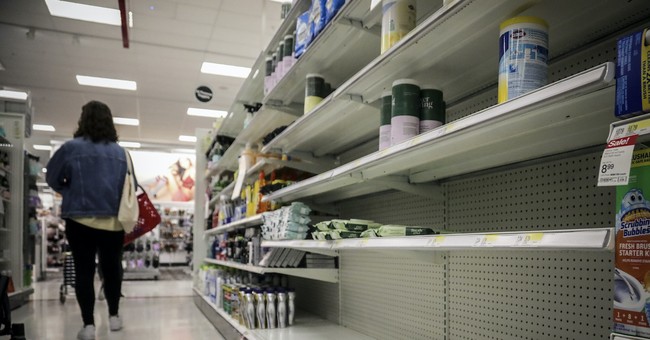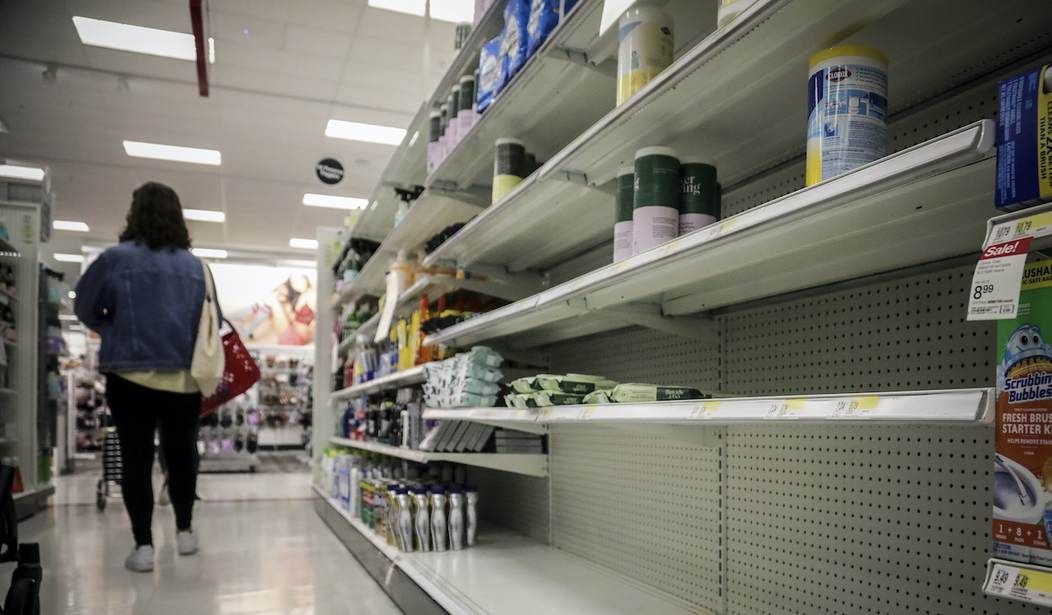
Empty shelves for disinfectant wipes wait for restocking, as concerns grow around COVID-19, Tuesday March 3, 2020, in New York. A man from New York City’s suburbs was hospitalized in serious condition with COVID-19 on Tuesday, a case that prompted school closings and quarantines for congregants of a now-shuttered synagogue. The state’s second confirmed case also raised the possibility that the virus is spreading locally. (AP Photo/Bebeto Matthews)
I’m starting to see posts from friends and articles from writers pop up calling the protests that are springing up in various parts of the country a stupid move. All of them have arrived at the same conclusion: stay indoors and keep everyone safe.
I’ve written ad nauseum about why this is not going to help and how more threats loom on the horizon, for instance, the health threats that come stock with poverty.
(READ: Tucker Carlson Points out Things About the Lockdown That Don’t Make Sense)
One thing that is undeniable is that being poor comes with health problems. Your healthcare isn’t exactly Cadillac, your diet has a higher chance of being bad, and the stresses of raising a family with little money can induce its own health problems. It’s a sad fact of life and one that we’ve been dealing with since time immemorial. In fact, epidemiologists refer to poverty as the “cause of causes.”
It’s also something that the left acknowledges, and even bases some of their more asinine ideas around, such as a perfect socialized healthcare system.
According to the University of California San Francisco, your wealth is one of the best gauges for success or failure of the human health condition:
“Socioeconomic status is the most powerful predictor of disease, disorder, injury and mortality we have,” says Tom Boyce, MD, chief of UCSF’s Division of Developmental Medicine within the Department of Pediatrics. Socioeconomic status is a term that often includes measurements of income, education, and job prestige – individually or in combination. The predictive power of income alone is perhaps most obvious when considering life expectancy. Impoverished adults live seven to eight years less than those who have incomes four or more times the federal poverty level, which is $11,770 for a one-person household, whether you live in Silicon Valley, the Rust Belt or the rural South.
Why is this? As the UCSF explains, money factors into a lot of things such as where you live, what you eat, and your stress levels. Lower incomes mean moving into potentially less safe neighborhoods where exercise becomes a risky endeavor due to crime and even car exhaust. Your health declines from the conditions. What’s more, you may not be able to afford healthier foods if you have the option to buy it:
Research forges a solid, convincing link between low socioeconomic status and bad health. Yet understanding how and why people in poverty are statistically at greater risk for disease is more complex. Diet and exercise play a big role in determining a person’s health status; however, research shows that health behaviors like these are largely driven by the context of where people live. Poor neighborhoods are more likely to have higher crime rates, lower-performing schools, and little access to healthy foods. “It’s difficult to exercise in an unsafe neighborhood, or to eat well in a neighborhood where healthy foods are either not sold or are more expensive than unhealthy options,” says Nancy Adler, PhD, director of UCSF’s Center for Health and Community. Transportation and time also factor into health behaviors. A person who has strung together three jobs to make ends meet for his or her family, and who must travel by bus to each job, likely does not have the luxury of time for exercise.
Then imagine layering on top of poverty a sick child. Take, for instance, a family with a child just diagnosed with severe asthma – a chronic condition commonly found in children living in areas exposed to high levels of automobile exhaust. “The mom may not have a job that lets her leave to take care of her child. She has to deal with health insurance, accessing specialists, and getting and affording medications,” says Anda Kuo, MD ’98, a resident alumna, and the founding director of UCSF’s Pediatric Leadership for the Underserved, a residency training program. “All of that is incredibly stressful, and we know that, ultimately, impoverished children with a chronic disease or cancer diagnosis face higher rates of morbidity and mortality than others.”
In fact, the sheer stress and adversity of poverty itself is perhaps its most toxic component, impacting multiple systems in the body. “We know that kids growing up in poverty are more exposed to toxins, noise, turmoil and violence,” says Boyce. “These exposures damage the capacity of the brain to develop optimally.” They provoke the body to produce the hormone cortisol, which sets the body on high alert so that people can maximize their capacity to escape a threat. Put in evolutionary terms, this means that if you encounter a lion, your body releases cortisol so you can get away.
“Cortisol basically shuts down functions you don’t need in a moment of extreme stress, like reproduction or digestion. Your blood pressure goes up, it mobilizes glucose, so you have energy for the escape,” says Adler. That’s fine when you encounter a lion every once in a while. But when you encounter stress every day at home or work, it takes a toll.
That’s just the tip of the iceberg and from just from standard poverty. It should be noted that our self-inflicted isolation is also causing suicide risks to skyrocket. According to KABC in Los Angeles, calls to suicide and help hotlines are up more than a staggering 8,000 percent. This isn’t just from the isolation, which is hard on pack animals like us as it is. Imagine being in isolation as you watch your bills come due and no job to show for it. Imagine not having much help in the way of finances.
You’re alone, you can hardly afford food, you’re jobless, and you don’t know when this will end. Hope starts to look like a stupid concept and ideas start to roll through your head that aren’t safe. The same can go for anyone who built a business from the ground up and put their entire life into it only to watch it collapse in the span of a few weeks because of these shelter in place orders.
Poverty doesn’t just affect physical health, it affects mental health as well.
And this isn’t even factoring in the effect of the crime high crime rates, which can be deadly in and of themselves.
I understand the fear of spreading the virus and that more people will die if we end this lockdown and get back out into the world of the living. I understand people thinking those that are out there protesting the lockdown are stupid, but in truth, none of these people are as dumb as you may believe.
The fact is, the virus has proven not to be as deadly as advertised. Projections have been falling like a rock thanks to testing and finding out that many people out there who were infected had no effects at all and people walk out of the hospital after fighting the virus just fine in droves. In fact, as Lisa Boothe pointed out, they found the Coronavirus to be far more common in people than we thought and the fatality rate far lower to boot.
BREAKING: Coronavirus random sampling study from Stanford. They found the infection is 50-85 x more common than previously thought & fatality rate accordingly 50-85 x lower than the crude numbers would suggest. #COVID-19 https://t.co/LWo4PTSjj0
— Lisa Boothe (@LisaMarieBoothe) April 17, 2020
Meaning this virus is far more infections than we thought and way more ineffectual for the vast majority of people who have or had it.
With that known, we can come to some easy conclusions. The effects of poverty are hard to escape. No matter what, it’s going to affect your health and you’re likely going to die earlier because of it. Infection by the coronavirus is hard to escape too but it’s far less likely to even put a dent in your day. Some people will become sick and sadly some will even die as many have already.
This is tragic, but a far greater tragedy will definitely occur if we stay locked up in our homes as our country crumbles around us.














